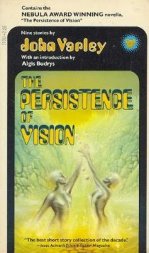
The Persistence of Vision
John Varley
The Magazine of Science Fiction and Fantasy, 1978
X: The Persistence of Vision
I'm cheating: after reading even a light bus-crusher like Eon I wanted something I could knock in an hour. This is a review of the short story The Persistence of Vision (tPoV), not the collection tPoV. The collection is very good and I recommend it but be warned it is out of print.
Synopsis: The US is in yet another serious "non-depression" and the narrator is out of work again. He decides to backpack to California, figuring he won't have the time to explore the US later in life. The US is in sad shape, from food riots in Chicago to melt-down refugees in the midwest. He encounters a colony of deaf-blind people in Navajo country who have set up their own isolated culture away from hearing society. He stays for a while, falling in love with a adolescent hearing child of the founders. The story has two threads after this: his gradual exploration of the increasingly sophisticated levels of communication the people of Keller [as he calls it] have developed and the history of the community, starting with the rubella outbreak in the 1960s which led to the birth of thousands of deaf-blind babies in the US. Eventually, he becomes aware that there are levels of communication which he can not aspire to, which even his hearing lover Pink, who has lived her entire life in Keller, can not aspire to. Unable to deal with this he leaves and enjoys some success in an increasingly decayed mainstream society. New Year's Eve 2000, he decides to return to Keller, where he discovers the adults have left through some means which is uncommunicatable to him. The children left behind have given up their sight and hearing to remove the barriers to understanding and he decides to join them in deaf-blindness.
I really should put 'synopsis does not do story justice' warnings.
Where there any 1970s SF stories which did not assume things would continue going to hell? Obviously in this TL, Alan Greenspan died young. The boom/bust cycles are much worse than in OTL, as bad as in the 19th century and with every cycle, more and more people are added to the unemployable catagory. One of the reactions is for small groups to set up new attempts at utopian communities, a very American thing to do, from Shakers to hippy communes.
What compels this story to be set near the turn of the century is the need for the rubella babies to be old enough to have kids. Otherwise, it could as easily be set in the late 1970s, when stagflation seemed endless and the instability of cartels not quite so obvious. The social despair required for the story might be driven by Watergate, the economy and the slide of the boomers into self-indulgent decadence[1].
It's a 1970s Varley short story so even if one disagrees with the real-world premises the story itself is pretty much guaranteed to be well written and worth reading. Varley excels at the short length and any of his collections are worth doing GBH to get hold of.
1: By which I mean some boomers. Not necessarily the ones with the lofty goals a decade earlier, either.